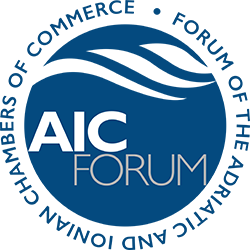In the framework of the EUSAIR Stakeholder Platform, Marche Region, Italian project partner of the “Facility Point-Supporting the Governance of the EUSAIR” project, organized three ONLINE EVENTS on the themes of CONNECTIVITY, that were held on 15-16-17 of December.
Connectivity as transports and infrastructures, Connectivity as sustainable Adrion-Ionian cycling route and Connectivity as digital innovation for effective solutions to Covid-19 pandemic.
The Webinar “CONNECTIVITY AND COVID-19: THE CRISIS AS A FACTOR OF DIGITAL TRANSFORMATION AND INNOVATIVE ACCELERATOR”, which was held on December 17, was organized by the Marche Region and the Forum of the Adriatic and Ionian Chambers of Commerce (Forum AIC), in collaboration with Marche Chamber of Commerce, Marche Polytechnic University, UniAdrion and FAIC.
The event focused on effective local solutions to Covid-19 pandemic in the intersection between connectivity, digital innovation, and novel social policies and saw the participation of a high number of the Forum’s Stakeholder, all committed to the future of innovation policies in the EUSAIR area, which will inevitably face a series of challenges, that address development issues related to digitization, blue and green economy, tourism, and wellbeing.
Moderating the debate Emanuele Frontoni (Marche Polytechnic University).
The meeting opened with greetings from the President of the Marche Chamber of Commerce and of the Forum of the Adriatic and Ionian Chambers of Commerce, Gino Sabatini, who stressed the importance of the webinar: “An event that gives us the opportunity to consider how Connectivity and Technological Innovation have become essential to our society. Our enterprises have encountered many difficulties while facing innovation and it is now time to focus and invest in creativity and most of all in Digitalization processes in order to overcome the barriers that keep us from growing”. In closing, the President stressed the vital importance of the Facility Point “wishing that the great opportunity we have to make use of the facility point will allow us to give a better response to the necessities of all the companies of the Adriatic and Ionian Area”.
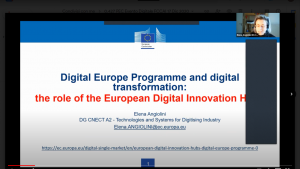 The first part of the Webinar focused on two main aspects for the next programming period (2021-2027): European guidelines on digital and Strategy for Innovation The meeting was opened by Elena Angiolini (European Commission – DG Connect) who presented an analysis of the current status of European Digital Innovation Hubs in Digital Europe Programme with an Overview of the Funding programmes related to High-performance computing, Artificial Intelligence, Cybersecurity & trust, Advanced digital skills, Digital transformation & interoperability. She outlined the importance of European Digital Innovation Hubs which provide technological expertise and experimentation facilities to enable the digital transformation of the industry and the public sector.
The first part of the Webinar focused on two main aspects for the next programming period (2021-2027): European guidelines on digital and Strategy for Innovation The meeting was opened by Elena Angiolini (European Commission – DG Connect) who presented an analysis of the current status of European Digital Innovation Hubs in Digital Europe Programme with an Overview of the Funding programmes related to High-performance computing, Artificial Intelligence, Cybersecurity & trust, Advanced digital skills, Digital transformation & interoperability. She outlined the importance of European Digital Innovation Hubs which provide technological expertise and experimentation facilities to enable the digital transformation of the industry and the public sector.
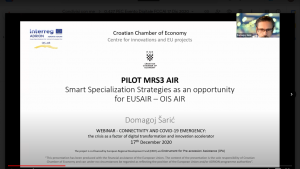 Domagoj Šarić (Croatian Chamber of Economy) offered participants a general overview on how Smart Specialization Strategies can become an opportunity for EUSAIR , by strengthening the regional innovation system and sparking smart growth through cross-regional collaboration, thereby responding to priorities, challenges and opportunities of the Adriatic and Ionian Region (AIR). He also stressed the global vision of these strategies: Built competitive transnational value chains in Adriatic and Ionian Region by deploying complementary resources & infrastructure and fostering innovation in S3 areas of common interest. The Macro regional Thematic Priority Areas have been divided in a number of Subtopics: Agro Bio Economy, Energy and Environment, Transport and Mobility, Tourism and Culture, Health and Medicine, each of them with specific outcomes, all linked to the same global result.
Domagoj Šarić (Croatian Chamber of Economy) offered participants a general overview on how Smart Specialization Strategies can become an opportunity for EUSAIR , by strengthening the regional innovation system and sparking smart growth through cross-regional collaboration, thereby responding to priorities, challenges and opportunities of the Adriatic and Ionian Region (AIR). He also stressed the global vision of these strategies: Built competitive transnational value chains in Adriatic and Ionian Region by deploying complementary resources & infrastructure and fostering innovation in S3 areas of common interest. The Macro regional Thematic Priority Areas have been divided in a number of Subtopics: Agro Bio Economy, Energy and Environment, Transport and Mobility, Tourism and Culture, Health and Medicine, each of them with specific outcomes, all linked to the same global result.
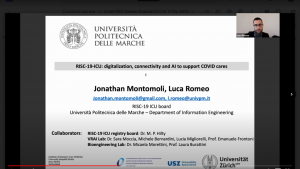 The second session of the webinar was dedicated to real experiences and best practices that demonstrate how digitalization fit in various economic sectors. Luca Romeo (Marche Polytechnic University) and Jonathan Montomoli (RISC-19-ICU board) took the floor, and described how artificial intelligence can help to fight COVID19 using the RISC-19-ICU registry. They considered how High dimensional data, Temporal ambiguity, Model interpretability, Sparse longitudinal observations and Unbalanced setting can represent some of the major Machine Learning Challenges during COVID-19. The aims of biomedical informatics is to convert HER into knowledge that could be exploited for designing a clinical Decision Support System(DSS), in order to be able to predict medical complications and plan the best treatment for the patients.
The second session of the webinar was dedicated to real experiences and best practices that demonstrate how digitalization fit in various economic sectors. Luca Romeo (Marche Polytechnic University) and Jonathan Montomoli (RISC-19-ICU board) took the floor, and described how artificial intelligence can help to fight COVID19 using the RISC-19-ICU registry. They considered how High dimensional data, Temporal ambiguity, Model interpretability, Sparse longitudinal observations and Unbalanced setting can represent some of the major Machine Learning Challenges during COVID-19. The aims of biomedical informatics is to convert HER into knowledge that could be exploited for designing a clinical Decision Support System(DSS), in order to be able to predict medical complications and plan the best treatment for the patients.
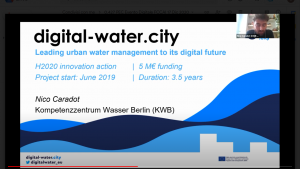 Nicolas Caradot (KompetenzzentrumWasser Berlin) then presented the Horizon2020 Project with a special focus on the urbanization of the water sector. The main goals are: Create linkages between the physical and digital worlds and Develop and demonstrate 15 advanced digital solutions to address water-related challenges. In order to reach these goals, the Project is developing practical solutions to the main European Challenges regarding the topic: bathing water quality, predictive asset management of drinking water wells, Innovative monitoring of sewer flows, Early Warning System for water reuse, Match making platform to support water allocation, Augmented Reality (AR) app to communicate groundwater issue with the public. The key point of the project is to integrate the product of the digital solution into the utilities system.
Nicolas Caradot (KompetenzzentrumWasser Berlin) then presented the Horizon2020 Project with a special focus on the urbanization of the water sector. The main goals are: Create linkages between the physical and digital worlds and Develop and demonstrate 15 advanced digital solutions to address water-related challenges. In order to reach these goals, the Project is developing practical solutions to the main European Challenges regarding the topic: bathing water quality, predictive asset management of drinking water wells, Innovative monitoring of sewer flows, Early Warning System for water reuse, Match making platform to support water allocation, Augmented Reality (AR) app to communicate groundwater issue with the public. The key point of the project is to integrate the product of the digital solution into the utilities system.
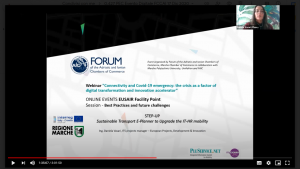 Daniela Vasari (Pluservice) intervened on the topic of transports, introducing the STEP-UP Project (SustainableTransportE-Planner to Upgrade the IT-HR mobility) which promotes multimodal passenger mobility in Programme area through delivery of information related to transport with various transport modes (maritime, air, rail, long-haul and urban transport) in a door-to-door perspective. The project was born to overcome the lack of cross-border information about travels and also events, and to trigger interoperability, multimodality and the promotion of the Adriatic Ionian area. It will also contribute to the reduction of costs due to private car usage, resulting in an environment friendly impact.
Daniela Vasari (Pluservice) intervened on the topic of transports, introducing the STEP-UP Project (SustainableTransportE-Planner to Upgrade the IT-HR mobility) which promotes multimodal passenger mobility in Programme area through delivery of information related to transport with various transport modes (maritime, air, rail, long-haul and urban transport) in a door-to-door perspective. The project was born to overcome the lack of cross-border information about travels and also events, and to trigger interoperability, multimodality and the promotion of the Adriatic Ionian area. It will also contribute to the reduction of costs due to private car usage, resulting in an environment friendly impact.
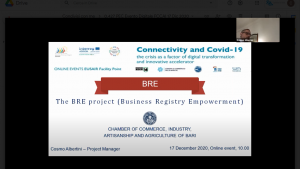 Cosmo Albertini (Bari Chamber of Commerce), presented the best practice “BRE Project: Business Registry Empowerment. Exchanging and improving experiences among Italian, Albanian and Montenegrin Business Registries”. The project is linked to the idea of innovation and connectivity because BRE aims at exchanging Business Registers best practice on 3levels: Technological (software and hardware architectures), Regulative (framework of laws about company registration), Operational (procedures for registration and offices organization). The ultimate BRE’s challenge is to transfer the Italian Business Register model to a CBC level, this because the Italian Business Register is fully computerized and it guarantees extreme timeliness in updating and accessing of data, managing a huge amount of information.
Cosmo Albertini (Bari Chamber of Commerce), presented the best practice “BRE Project: Business Registry Empowerment. Exchanging and improving experiences among Italian, Albanian and Montenegrin Business Registries”. The project is linked to the idea of innovation and connectivity because BRE aims at exchanging Business Registers best practice on 3levels: Technological (software and hardware architectures), Regulative (framework of laws about company registration), Operational (procedures for registration and offices organization). The ultimate BRE’s challenge is to transfer the Italian Business Register model to a CBC level, this because the Italian Business Register is fully computerized and it guarantees extreme timeliness in updating and accessing of data, managing a huge amount of information.
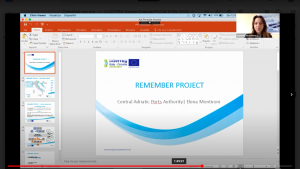
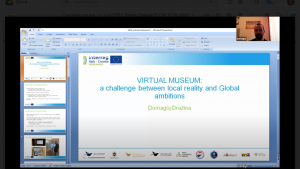
Elena Montironi (Central Adriatic Ports Authority) and Domagoj Dražina (National Museum Zadar) then presented the experience f the Remember Project (Restoring the memory of Adriatic ports sites. Maritime culture to foster balanced territorial growth) and the Case study: Zadar Museum “Virtual Museum: a challenge between local reality and Global ambitions”. The project aims at creating the conditions for new sustainable development opportunities from the exploitation of the Adriatic maritime cultural heritage. The overall Objective is to promote the shift towards sustainable tourism and blue growth in the Programme area through the valorization of the important maritime cultural heritage of the 8 Adriatic Italian and Croatian ports sites involved in the initiative.
With the case study, the participants were given a more in depth representation of the benefits of the project: it is important to be aware that the biggest changes in the development of museums are happening right now, with the digitalization and new technologies, so it becomes inevitable that museums of the future will have some new assignments and challenges; digital technologies are a means to achieve the mission of the museum of the future.
Conclusions have been made by the three representatives of the managing authorities: Lodovico Gherardi,(Interreg Adrion); Mauro Novello (Interreg IPA CBC Italy-Albania-Montenegro); Laura Comelli (Interreg Italy-Slovenia), Interreg Italy-Croatia (tbc). They stressed the importance and punctuality of the meeting and its objective of giving an innovative point of view regarding the possible responses to the crisis situation we are all facing. Laura Comelli analyzed the current situation of the programmes and remarked that digitalization and connection weren’t the main focuses of the projects, but they ended up being very important during the processes ad in order to deliver all the planned outcomes. She declared herself convinced that the next programming period will be strongly linked to the theme of digitalization and we all need to start reshaping our global vision being aware of the changes we are facing. Mauro Novello strongly agreed with this last statement and added that COVID-19 made us understand how fundamental digitalization is for cooperation activities. He added that it is now our responsibility to capitalize what we have done and learned during this period; digitalization is all over the priority axes as we had the opportunity to hear during this meeting and all the sectors are involved. Lodovico Gherardi was last to take the floor, with a powerful statement “this is a lifelong learning process; nothing will remain as it was before”, a general consideration that fits perfectly into the COVID situation. He underlined that it is necessary to increase the connection between different areas (medicine, transports, culture, creativity, tourism, utilities…), this will create the possibility to connect also different programmes and projects in order to implement even more the EUSAIR Strategy. He concluded affirming that it is vital to increase the stakeholder involvement.
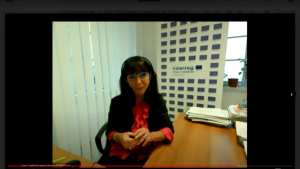
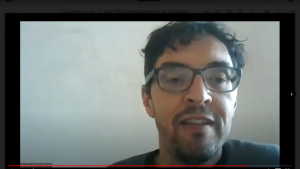
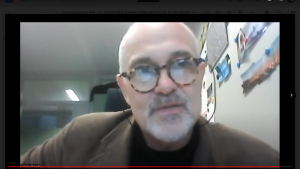
The debate will continue in the group created within the Stakeholder Platform, in which the presentations of the speakers and the recording of the event have been uploaded.
